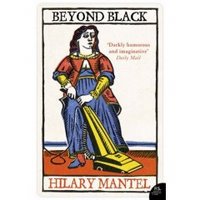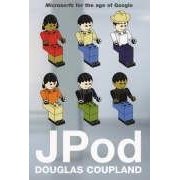Highs of 2006: Hilary Mantel, Kazuo Ishiguro, Julian Barnes, some Economics and Douglas Coupland
It’s that time of year when you buy your Guardian (surely nothing else?) and discover half the Review section is filled with ''Top Reads for Christmas'' lists from an array of literary celebrities with a few reality TV stars thrown in for a populist (and probably ironic) slant. Curiously it seems to be the same celebrities, and the same books, recommended across all the papers, but I guess that’s marketing for you (can’t complain; it pays the rent, and holidays to Bangladesh). So in the spirit of pre-Christmas literary fervour I offer here a selection of my favourite books from 2006. This exercise brought home the unfortunate fickleness of my short-term memory when it comes to books (part of the reason I started this blog). I rarely remember the books I’ve read, to the extent that even if I’ve read 5 in the last month, if someone asks me if I’ve enjoyed anything recently, I’m at a total loss. So this list was constructed via a perusal of my book shelves and a racking of the brain to think if I read them recently, and therefore, probably in 2006. Some, but not all, of them were published in 2006, but that kind of distinction seems a bit redundant in any case. Here they are: I liked them, maybe you will too.
 ‘Beyond Black’, Hilary Mantel
‘Beyond Black’, Hilary MantelI’ve had a bit of a chip on my shoulder regarding Hilary Mantel since my 6th form English teacher suggested I write my dissertation on ‘Fludd’ but I thought it very boring and chose to do John Steinbeck instead (a curious choice, I admit). But the premise of this book – a middle-aged medium, Alison, touring the M25 psychic shows with her sidekick Colette and a litany of spirits – made me curious enough to give her another go, 10 years later. And it was worth it – it’s a bizarre mixture of the normal and paranormal that never quite makes a judgement about whether the paranormal exists or not. But it doesn’t matter, because it’s Alison’s reality, and somehow Mantel manages to take you along with it, without needing to make your own decision or consciously suspend your disbelief. It’s a bit dark, admittedly, but well worth a read.
 ‘Never Let Me Go’, Kazuo Ishiguro
‘Never Let Me Go’, Kazuo IshiguroSo, when did you work out what was going on? Interestingly, in a podcast with the Guardian Book Club Ishiguro said that he never felt the suspense was an important part of the book and almost wrote it with the premise openly explained from the beginning. On reflection, this made sense to me – the main power of the book comes not from the reveal, but the introduction of a dystopian alternative-present outlined in a credible way (no robots or flying cars here). This is absolutely nothing like ‘’The Remains of the Day’’ (though there’s probably a really fantastic comparative thesis in there for someone cleverer than I) but in my opinion, better for it.
 ‘Arthur & George’, Julian Barnes
‘Arthur & George’, Julian BarnesI started reading Julian Barnes in a rather odd fashion – a friend who works in the British Council in Athens was organizing an event where Barnes would be discussing his new book and doing some Q&As. Given the general paucity of cultural events in Athens in which I can actually participate (due to the ever-present language barrier) I thought I would read Barnes’ latest novel ‘’Arthur & George’’ and then pop along. It was well worth it – the book was great, and Barnes is a born raconteur. He kept us entertained for well over an hour whilst the shoddy simultaneous-translation system created the odd effect of half the room laughing a good minute after Barnes had made a gag (a high-brow version of the subtitling of American action films where the Greek audience gasp 10 seconds before I do). I was glad I hadn’t read the reviews (or indeed the back cover) of ‘Arthur & George’ as I had the pleasant sudden realization of who it was I was reading about, which doesn’t happen much these days with books, or films for that matter. So without giving it away, it’s an intriguing story ‘based on real events’, and you shouldn’t be put off by the cod-Victorian cover artwork as I was until pressed into action by the worthies of the British Council.
 ‘Freakonomics: A Rogue Economist Explores the Hidden Side of Everything’, Steven D. Levitt & Stephen J. Dubner
‘Freakonomics: A Rogue Economist Explores the Hidden Side of Everything’, Steven D. Levitt & Stephen J. DubnerEver wondered whether why drug dealers live with their mothers? What schoolteachers and sumo wrestlers have in common? Me neither, but it turns out we’ve probably been asking the wrong questions. This is a very entertaining book that takes an alternative view on a number of major social phenomena, the Steph/vens perhaps the Julie Burchill of the economics world (although I fear that is probably a major insult). I’m not educated enough to know if what they propose is actually right or not, but it’s certainly persuasive and pleasingly based on first principle economics that even a total economics-avoider like myself can handle. Yep, it’s an oxymoron: a funny book on economics.
 ‘JPod’, Douglas Coupland
‘JPod’, Douglas CouplandIf you work in marketing or advertising or some related field, you need to read this. Granted, you will probably weep in self-pity afterwards, but at least it told it to you like it is. This is a return to form for Coupland, who I’ve loved since Tom lent me ‘Generation X’ at university. There’s been a few hit-and-misses since – ‘Eleanor Rigby’, ‘Hey Nostradamus’, ‘Miss Wyoming’ being of variable praise – but for me at least this was classic Coupland. You can also amuse yourself and confuse your friends by showing them the not inconsiderable number of pages that are filled with binary numbers. I did so whilst sunbathing on a beach on the coast near Athens, thus proving that whilst *you* may look better in a bikini, I read weirder books. Cool.
So the big question is... what were *your* top books of 2006? Don't be shy now... (and do register so you can post a comment - it's only 30seconds and then you have the joy of being able to comment in the future as well! Hurray!)


1 Comments:
Very interesting insights Jenny. I really must read some more.
Post a Comment
<< Home